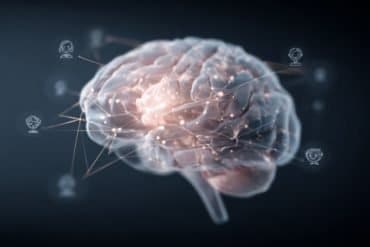Summary: People who are more accurate at reading another person’s emotions are better able to understand what a musician is trying to convey through their compositions. Additionally, those with higher empathetic accuracy are better able to feel the emotions conveyed through music.
Source: Southern Methodist University
Can people who understand the emotions of others better interpret emotions conveyed through music? A new study by an international team of researchers suggests the abilities are linked.
The study’s results provide a foundation for future research that could test the impact of socially engaged music listening on social cognitive ability, and whether listening to music can be added to therapeutic techniques used in social skills training for individuals with autism spectrum disorders or schizophrenia.
The findings were published recently in Emotion.
The study was led by Benjamin A. Tabak, assistant professor of psychology and director of the Social and Clinical Neuroscience Lab (SCN) at SMU (Southern Methodist University) and Zachary Wallmark, assistant professor of musicology and affiliated faculty at the Center for Translational Neuroscience at the University of Oregon.
“Empathy is most often thought of in the context of social interactions, but there are many other forms of social communication, including music,” Tabak said. “Music can convey meaning and emotion and also elicit emotional responses, but the mechanisms responsible for its emotional power are poorly understood.”
Tabak and his colleagues wanted to test their theory about empathy and music. For the purposes of this study, they measured the ability to correctly understand others’ thoughts and feelings (empathic accuracy) and the extent to which one feels the emotions that another feels (affect sharing).
“We thought it would be interesting to study whether people who more accurately understand others’ thoughts and feelings might also be more accurate in understanding what musicians are intending to convey through music,” Tabak said. “Similarly, we wanted to know whether people who tend to feel the emotions that others are experiencing also tend to feel the emotions conveyed through music.”
The initial set of findings found support for both hypotheses. In particular, the results suggest that empathic accuracy as a skill extends beyond interpersonal interactions into music. Researchers hope these results will provide a foundation for future studies regarding the impact active, engaged music listening may have on improving social cognition.

Tabak and Wallmark believe that the study provides tentative support for the theory that music is first and foremost a social behavior that evolved to help individuals connect with others and better understand and manage their social environment.
“This matters on several levels, including the potential to develop new music-based interventions that may assist individuals with difficulties in understanding how others think and feel,” Tabak added.
Tabak pointed to the interdisciplinary approach he and his colleagues used during their study as a template for future research projects in this area. In addition to Tabak and Wallmark, whose scholarly work falls in psychology and musicology, respectively, the research team also included two statisticians and another psychologist with expertise in social cognition in schizophrenia.
“When we came up with this idea several years ago at a coffee shop in Dallas, researchers had only conducted studies that indirectly addressed these research questions, few of the previous studies had included large samples, and none had included a replication study,” Tabak said.
“We also hope that our work will highlight the value of conducting interdisciplinary research that spans the sciences and humanities,” he added.
“Work like this, that takes a well-known psychological construct like empathy and examines it in an unconventional way by asking what people think a musical composer is trying to convey through a piece of music, might propel others to ‘think outside of the box’ and ultimately gain a greater understanding of a process though interdisciplinary collaboration,” he said.
About this music and empathy research news
Author: Press Office
Source: Southern Methodist University
Contact: Press Office – Southern Methodist University
Image: The image is in the public domain
Original Research: Closed access.
“Initial evidence for a relation between behaviorally assessed empathic accuracy and affect sharing for people and music” by Benjamin A. Tabak et al. Emotion
Abstract
Initial evidence for a relation between behaviorally assessed empathic accuracy and affect sharing for people and music
Are people who are better able to understand or feel the emotions of others also better at understanding or feeling emotions conveyed through music?
Although evolutionary theories have proposed that both empathy and music help to foster social connection, few studies to date have examined the relation between behavioral assessments of empathic processes for people and music.
We examined this question using 2 independent samples: a laboratory sample of undergraduates (n = 236) and a larger online direct replication with participants across the United States (n = 596).
Across both samples, linear mixed effects models showed positive associations between empathic accuracy and affect sharing for people telling personal stories and for musical expression, and results were maintained when including relevant individual differences as covariates.
These findings provide initial evidence of a relation between behaviorally assessed empathic processes across social and musical domains.
Future research is needed to build upon this evidence by investigating whether active, socially engaged music listening may have a beneficial effect on social cognition.






